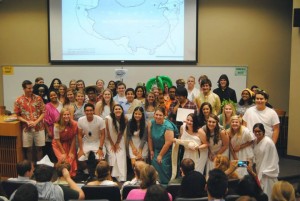
Tests have a way of taking a subject you love and turning it into something you simply tolerate.
Freshman and sophomore friends, you have just endured the first round of World Cultures tests, and maybe that has happened to you.
Has Achilles become nothing more than a man who interacted with too many people, whose names you had to remember? Did the Odyssey devolve from a man’s journey home into a dark metaphor for the difficulties you will face on your road to graduation?
I was once there – the night before the first World Cultures exam, watching the stories I had enjoyed reading in class turn into little facts that fit on a notecard. When my first World Cultures V exam comes along, the temptation to see the class as burdensome will rise once again.
This is a message for you and me: Do not miss the beauty of your World Cultures classes.
World Cultures is not just a history class. If any of you have been paying attention, that much should be easy to see. Now that those first exams have passed and you have a little free time, let us take a breath and break down why this particular BIC requirement is so great.
We cannot have this conversation without mentioning the professors. The World Cultures faculty have such excitement about what they do, and they spread that enthusiasm as they share about their areas of interest. If we were in a regular history class, we would have one professor. That one professor would cover a wide-range of moments in history, some they might love and others they might not. In World Cultures, the risk of having a less-than-enthusiastic professor is almost non-existent. The World Cultures large groups allow each faculty member to teach the topics that interest them. This means we get to see historical events through the eyes of people who already love them.
Do not underestimate the significance of this. Before World Cultures III, the French Revolution was practically nowhere on my radar. All it took was fifty minutes listening to Dr. Longfellow and the event came to life in a captivating way. World Cultures is a place where you will hear lectures that will stay with you.
Such moments occur in our small groups as well, however. Great things can transpire when we are given space to think about and discuss history and culture with engaged people. World Cultures small groups create those spaces. Yet we are just as responsible as our professors are in creating those amazing moments. To get the most out of our class, we must engage both the material and our classmates. When we do, we might be surprised by the insights and perspectives that bubble to the surface.
Our World Cultures classes are unique. We have excellent professors eager to share their interests to a roomful of students who have the potential to understand that knowledge in unique ways. You may have heard this message before. I am saying it again because it is true. We have the privilege of taking these classes; let us make the most of them.
Kara Blonquist is a senior BIC student majoring in linguistics.